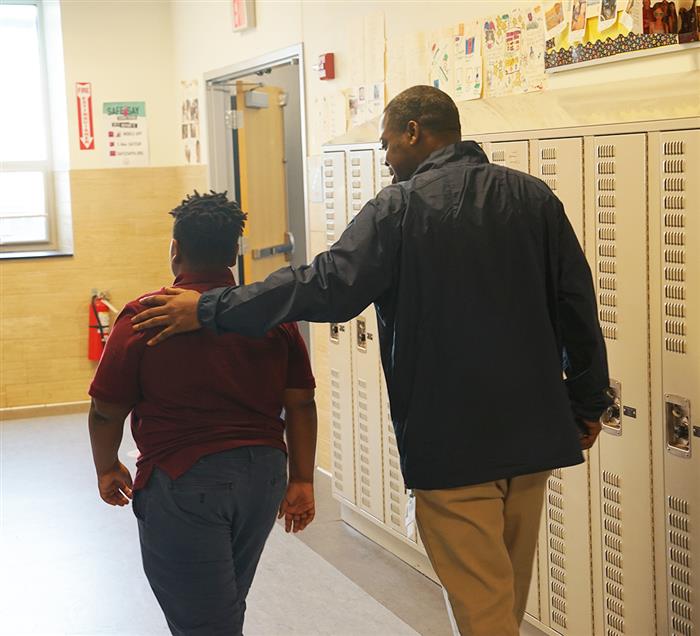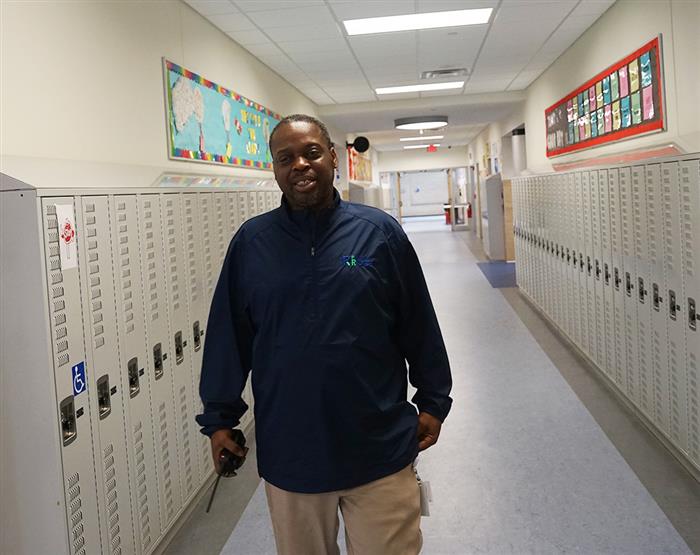Administrative Services
Page Navigation
- Administrative Services
- Evaluation, Grants & Data
- Finance & Business Operations
- Human Resources
- Marketing & Strategic Communication
- Project SEEKS SES
- Technology Services
- Safety & Security: Services & Support
- Special Education Administrative Support
- Diversity, Equity & Inclusion
- BridgeUP
McKeesport Area School District YESS Team makes a big impact on the district's students
Posted by Jeremy Tepper on 2/6/2024


As Troy Brown walks the hallways of Founder’s Hall Middle School, he stops to talk to every student passing by, greeting them and asking them how they’re doing.
For Brown, every interaction — no matter how small— matters quite a bit. As the leader of the McKeesport Area School District’s YESS (Youth Engagement Support Services) team, Brown’s role is malleable, focusing on things such as mediations, de-escalation, monitoring lunches and the hallways during transition, and generally just helping create a more positive school environment.
For Brown to do his job well, though, relationship-building is key. Students might often take some time to trust an adult in school. So Brown tries to always stay present and positive, knowing that every day is an opportunity to strengthen a bond.
“We need to reach out to these kids and make sure we’re being positive and having positive influences on kids at all times,” said Brown. “It’s really needed, especially in McKeesport.”
McKeesport’s YESS team is staffed by Pressley Ridge and funded by Project SEEKS SES, a partnership between the Allegheny Intermediate Unit (AIU) and the Allegheny County Health Department (ACHD) that addresses trauma, behavior and mental health issues in ten school districts. Pressley Ridge partnered with the Penn Hills School District to pilot the YESS team model in the district’s middle school in 2021.
McKeesport's YESS team is comprised of seven total members, three who spend their time at Founder’s Middle School and three who work at the McKeesport Area Senior High School. Brown heads the group and alternates his time between both schools. The team started in the district this school year.
The need for a YESS team became apparent during asset mapping for Project SEEKS SES, when the district compared suspension data, expulsion data and overall discipline data between its three schools, realizing those numbers increased at the Middle School and High School, where the district has less support staff.
That’s where the YESS team comes in, helping fill the gaps and serve as an extra layer of support. While data is still being parsed, Angela Cale, the district’s Coordinator of Special Education and Alternative Services, said she believes that office referrals have decreased significantly since the YESS team arrived.
Dr. Jamie Lusebrink, the Founder’s Hall Building Principal, concurred with Cale, lauding the impact the team has been able to make.
“The YESS team has definitely helped fill that gap for a lot of students. From K-5, the students have had access to things that they didn’t have access to at the Middle School,” said Dr. Lusebrink.
“I think the YESS team has done a great job of building those relationships, maintaining those relationships, and helping deescalate and prevent situations from occurring that we may have not been able to effectively do in the past.”
Building strong relationships with the district’s students has been an ongoing process for the YESS team. The team is thoughtfully composed of members who are either from McKeesport or from similar communities, which has helped with the process. Before they started in their roles, students were already familiar with some of the YESS team, especially Brown, who is from the community and has been entrenched in the area’s youth sports, having helped coach the McKeesport Little Tigers and the high school football team for the past 15 years.
“I know a lot of the kids, so the relationship building has been an easy transition. They’ll come to us for anything and everything, which makes us feel good that we’re able to help in any type of way,” said Brown.
“We just really get to know the kids and try to see what their wants and needs are. And I think the more that we’re here, the more relaxed they are to come and talk to us about things that they may not talk to other people about.”
For Brown and his staff, every day is a little bit different. There are some core responsibilities that remain the same, like greeting students during arrival and dismissal and monitoring the hallways and lunches. Helping with mediations, conflict resolution, de-escalation and related issues comes on a needed basis, but are crucial interactions when they arise.
“That’s the main thing, making sure we get to the kids. Even if they are wrong, we want to come up with a resolution to the problem, so it doesn’t become a bigger thing,” said Brown.
“We’re definitely trying to get to the root cause, but also the resolution is important to me. They want that. They don’t want to be enemies, they don’t want this friction to be going on.”
In the past, mediations and de-escalation have often fallen on the counselors’ shoulders. Having the YESS team has helped lift the burden, while also being key in helping limit future issues from spiraling.
“As adults we might not see these situations as pressing, but to middle school students, it is the biggest thing that has ever happened to them. That could be the difference between them going into a classroom and learning or going into a classroom and being tense and anxious the entire time,” said Dr. Lusebrink.
“It could be just 10-15 minutes that they need out of class to have a successful day. So 15 minutes sometimes saves us three hours.”
Going forward, the YESS team’s role will continue to evolve. Cale, Brown and Dr. Lusebrink all concurred that their work at Founder’s Hall is crucial, as middle school-aged students are at a foundational stage in their lives, where they begin to further find their identities and behaviors become more ingrained. But as they see it, every day is crucial. Every day is an opportunity to strengthen bonds, and to make an impact on a child.
“When you think back to your days in school, you don’t think about your favorite school experience as being that concept in algebra or that paper that I wrote. It’s the relationships that you build in school,” said Cale. “And I think it’s important to note that in adding the YESS team, we’re hoping to make sure that kids have those positive relationships with adults so that they want to come to school and stay in school.”


You are commenting as Anonymous